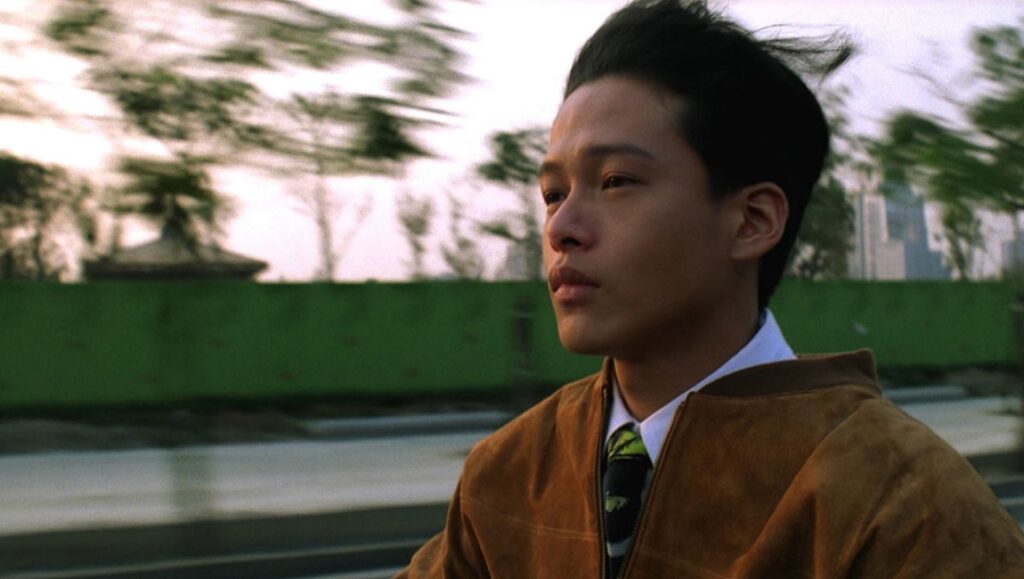In many ways, Tsai Ming-liang’s Vive L’amour follows (or establishes, given its chronological situation within his filmography) many of the director’s most characteristic tendencies. From the outset, wonky angles capture images in slight distortion; primary characters exhaust nearly half of the film’s runtime before any speak to each other, submerged as they are in their own isolation; familiar themes of disconnection and affection abound. Water, a force both oppressive and sustaining across his oeuvre, is here presented in more nuanced form – bottles are cubbied away, bathtubs repeatedly filled — offering both utility and comfort. These superficial graces acclimate the viewer to Tsai’s familiar cinematic world, but Vive L’amour ultimately proves somewhat singular in the director’s pre-Walker output. Though doses of humor regularly – if fleetingly – manifest in his films, this proves unique in its slow cinema approximation of a rom-com, orchestrating its romantic entanglements, humorous vexations, and logistical inconveniences with a lightness not often felt in Tsai’s work. The narrative traces the lives of three unconnected young people across a brief period of time (a few days?) in which the trio each come to rely on an unoccupied apartment for its restorative potential. One, Hsiao-kang (Lee Kang-sheng), is a driftless salesman who first attempts suicide, but becomes fixated by the condo’s newfound mini-ecosystem. The other two, May Lin (Yang Kuei-mei) and Ah-jung (Chen Chao-jung), are a pair of singles who meet by chance, retreating to the unoccupied space for a tryst, and later returning for follow-ups. Their first sexual encounter deviates from Tsai’s penchant for interrupting (typically self-initiated) sexual release and offers a fitting representation of the characters’ messy and desperate pursuit of connection and purpose. May Lin and Ah-jung, only partially undressed, collapse onto the bed, her kissing of his chest devolving into something less intentional, more primal and impatient, red lipstick smearing across his form before a cut abruptly ends their passion.
Though doses of humor regularly – if fleetingly – manifest in his films, this proves unique in its slow cinema approximation of a rom-com, orchestrating its romantic entanglements, humorous vexations, and logistical inconveniences with a lightness not often felt in Tsai’s work.
This pivot in tenor — the expected somberness infused with something more lighthearted — is reinforced in the way these characters are presented and in the spaces they occupy. Rather than garb its characters in sweat-soaked tank tops and casual slacks, Vive L’amour opens with images of Hsiao-kang in a crisp white collar and tie, May Lin in realtor-professional wear, and Ah-jung in a sleek leather jacket. The luminosity of flashing arcades and nighttime streets and the constant din of pattering rain from Rebels of the Neon God are absent, as are the dankness, dilapidation, and disrepair that so often dominate the environments of Tsai’s later films. The shared apartment here is a place of casual luxury, its décor unfamiliar to the characters in its material excess, and its geometric rigor in conflict with their emotional disorder. Still, there are familiar ruminations on the beleaguered pursuit of intimacy, the complicated intersection of shared loneliness, and the symbolic potential of sexual release — all of course magnified through Tsai’s formalist rigor and taste for rhythmic languor, establishing each scene as a space to be shared with the viewer. But Vive L’amour is ultimately more notable as a tonal outlier, lacking as it does the brutal complexion of The Wayward Cloud (arguably the director’s most successful romance) or Stray Dogs. A few comedy-of-errors moments give it a unique flavor and its climax offers the first taste of more powerful but similarly inflected ones to come, yet considered from the present, its contemporaneous radicalism feels slightly unsettled. It’s an in-process work by a master who was working toward distillation.
Part of Kicking the Canon – The Film Canon.


Comments are closed.